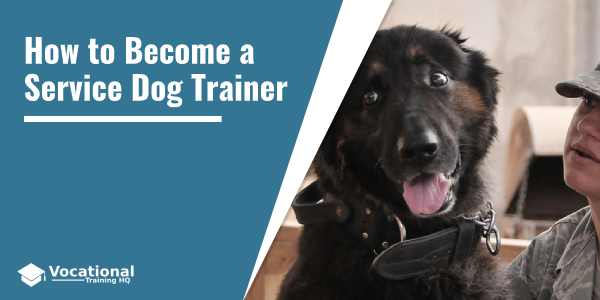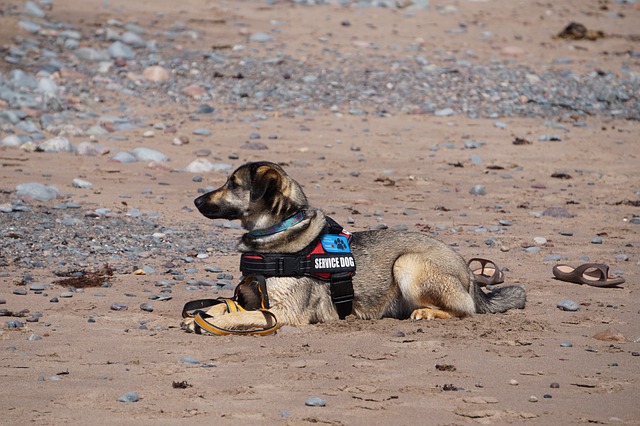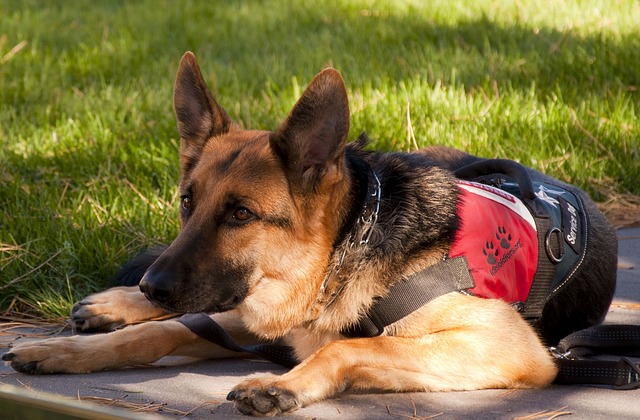A career of a dog trainer or service dog trainer can be rewarding but it takes a lot of work.
The love for animals is just the beginning.
The most experienced dog trainers say that the hardest part of the job is working with people.
Whether you want to become a pet dog trainer or a service dog trainer, there are no legally required certifications or standards.
Anyone can become one and start their own training organization or business.
Most dog trainers are either self-taught or learned what they know from other trainers, online courses, books, short seminars, etc.
Some of the best trainers out there don’t even have any formal training.
Therefore, if you acquire some formal training, it can benefit you.
There are various schools in the US that teach service dog trainers.
Some are small and started with experienced dog trainers (training military or police dogs, or other working dogs) later moving into training service dogs for people with disabilities and then starting to train the trainers themselves.
Bergin University is one of the best places to learn how to become a service dog trainer in the country, and maybe even the world.
If you are looking for the best service dog training education, Bergin University is the place to go.
The two other great resources to use are the Certification Council for Professional Dog Trainers (CCPDT) and the Association of Professional Dog Trainers.
Article Table of Contents
About Service Dogs and the ADA
The ADA exists to allow disabled people to use their service dogs in public with minimal restrictions.
Unless access is as open, every building, dry cleaner, restaurant, and other places in the country could refuse disabled people their services and demand proof of training.
The ADA states that if someone says their dog is a service dog, their word is to be taken, whether it was certified by a state or another authority.
Specifically:
- In section § 35.136 service animals (f), the ADA states:
“A public entity shall not require documentation, such as proof that the animal has been certified, trained, or licensed as a service animal.” - The ADA also states that disabled people may train their own service dogs.
For many individuals, program-trained service dogs can be expensive and out of budget.
Some service dogs can cost more than $10,000.
About USSDR
With over 100 service dog trainers in America, the United States Service Dog Registry (USSDR) is the most democratic implementation of an assistance animal registry and behavior standards and training agreement.
It includes a registry with completely voluntary and free online self-registration held by an independent, privacy-conscious, non-governmental, and secure service.
USSDR is made with the efforts of experienced trainers and service dog owners.
They believe that those who wish to knowingly and voluntarily comply with ADA law and additional and specific set of community-defined training and behavior standards should have such an opportunity.
These behavior and training standards include more than the ADA and basic foundations of a Public Access Test do.
A Higher Standard for Service Dogs and their Handlers
The purpose of USSDR is to allow people the opportunity to hold themselves and their animals accountable voluntarily to higher standards.
They do so by publicly signing a specific set of behavior and training standards going beyond the law.
Only registering with USSDR or state doesn’t qualify an animal as a service dog or provide special rights.
If someone doesn’t comply with the training and behavior standards of USSDR, their registration can be suspended or removed.
What does Registration with USSDR mean?
USSDR is an additional step going beyond the law.
The law doesn’t require service or assistant dog teams to have or show identification in the form of special harness, vest, training certificate, or registration.
Animals also aren’t required to be officially trained, registered, or certified by any state, independent, or federal organization.
USSDR is aimed at reducing the number of people who abuse the ADA.
To do so, they require registrants to understand that an intentional misrepresenting of an animal as service or assistance animal is unethical and illegal.
All registrants should accept and understand the following:
- The definition of a service or assistance animal.
- How important their behavior, and that of their service or assistance dog, is to the general public and other service and assistance animal teams.
- What is involved with a Public Access Test.
- What is involved with training and using a service or assistance animal.
- The minimum training standards for a service or assistance animal.


